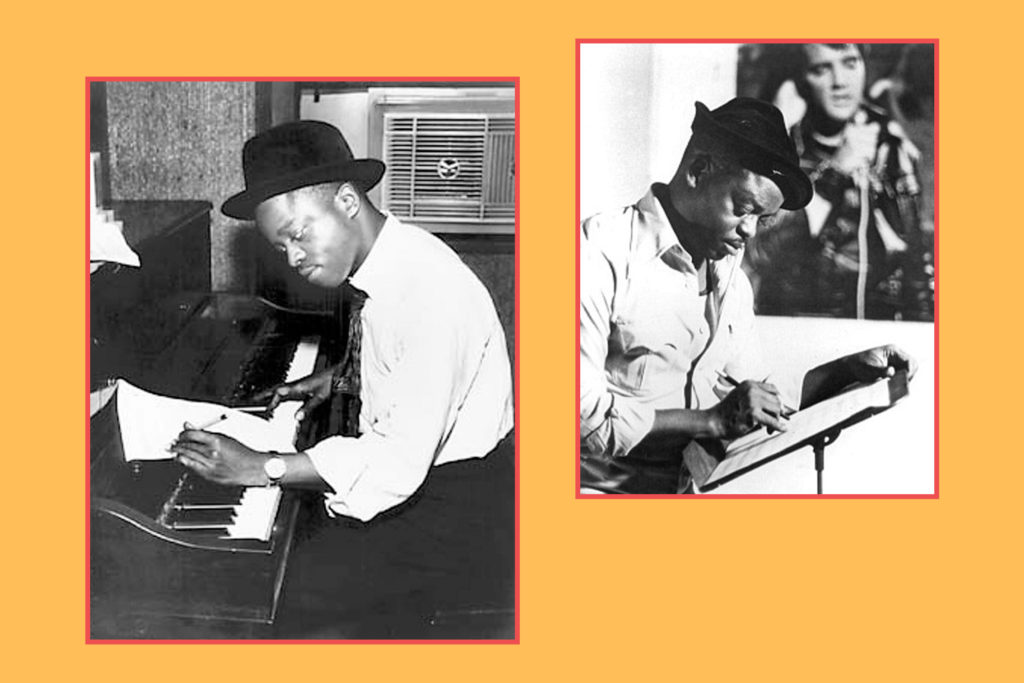+ Take your modern jazz piano and hip-hop beat making to new heights with Soundfly’s new course, Elijah Fox: Impressionist Piano & Production!
When it comes to household names in early Rock ‘n Roll history, some of the biggest usually come to mind: Chuck Berry, Little Richard, Elvis, Fats Domino, Buddy Holly.
If pressed, some might even be able to name people like Big Mama Thornton or Sister Rosetta Tharpe (names that until somewhat recently had been overlooked by all but the most fervent music fans). There are of course dozens upon dozens of writers and artists — maybe more — that contributed greatly to the rise of rock music whose impact is still felt today yet often get overlooked.
One such writer and performer is the great (and also tragically overlooked) Otis Blackwell.
Ever wonder who wrote Jerry Lee Lewis’ monster hit “Great Balls of Fire?” That was Otis Blackwell.
What about “All Shook Up,” or “Return to Sender,” or “Don’t Be Cruel” — all enduring Elvis Presley hits? Blackwell again.
What about the monster hit “Fever,” covered multiple times and made famous by Peggy Lee, and later Madonna and Beyoncé (also used to promote her fragrance, Heat)? Otis strikes again.
Born in 1931 in Brooklyn, Otis Blackwell grew up singing Gospel songs around his family’s piano. It wasn’t long before he struck out to make a career as an artist, and in 1952 he found himself signed to RCA records. Soon he would be working for a publisher and earning $25 a week (nearly $300 in today’s currency) to write songs.
+ Read more on Flypaper: “4 of Our Favorite Music Conspiracy Theories Out There.”
Meanwhile, Otis had a moderate hit as an artist, his “Daddy Rolling Stone,” which would later be recorded by The Who.
Yet one of his very first hits he had as a writer, was “Don’t Be Cruel” — a song that Elvis, who followed Otis’s vocal interpretation closely, would take to #1 and turn into a Platinum record.
“Don’t Be Cruel” was in fact released as the B-side to Elvis’ “Hound Dog.” It is the only record in history to have both sides chart in the US at #1 (technically, “Don’t Be Cruel” was the bigger hit, with more weeks at #1, but who’s counting?).
The hit didn’t come a moment too soon for Otis. Despite his hit as a performer, he was struggling. As he stood in his worn through shoes, shivering in the cold and rain on a New York City street, a friend walked by and asked if he had written any songs lately. Otis said he had, and subsequently sold six to a publisher via his friend soon after; including “Don’t Be Cruel.”
Although the two would never meet, Otis quickly became a sought after writer for Elvis, who had already been a fan of his.
But it wasn’t all sunshine and roses.
Via Elvis’ manager, Colonel Tom Parker, Otis was forced to give up half of his writer’s credit and list Presley as a writer. “I was told I had to make a deal,” Otis would later tell reporters. This was, unfortunately, extremely common in those days. Writers and artists — often Black, poor and/or under-educated in the ways of the music business — would get ripped off for the cost of making good on an opportunity, and had no negotiating leg to stand on.
Unpaid royalties were commonplace, sharing credit with DJs or artists who had nothing to do with the song was more common still, and sadly some got no credit or recognition whatsoever while a “more socially acceptable” artist (read: white) took their song up the charts.
Black artists were often paid ten times less than their white counterparts too, as Little Richard discovered to his dismay. Richard was notoriously paid less than a penny for every copy of “Tutti Frutti” sold.
+ Read more on Flypaper: “The Lyrical Genius of Chuck Berry.”
Further complicating Otis’s history is his having to use a “white sounding” pseudonym (“John Davenport”) as a result of some bad deals with publishers. Between this and giving unmerited credit on his songs, the truth about his influential catalog is obscured to the casual observer, and in some cases even the most avid rock music follower.
But the fact is, Otis wrote over a thousand songs and sold nearly 200 million records; which makes him one of the greatest R&B writers of all time, and a key pioneer of early Rock ‘n Roll music.
Otis appears to have made enough from his music to live his life comfortably, but certainly not as lavish as those who took advantage of his talent. He always maintained that he was treated fairly: “He got famous and I got rewards. That’s fair,” he is quoted as saying. And by the standards of the 1950s, I suppose he was treated more fairly than some. But he still deserved so much more credit, both tangible and intangible.
Fortunately, Otis experienced a bit of a renaissance in the late 1970s, when Stevie Wonder acknowledged him during an awards ceremony. He began touring again and recording his own songs, and was inducted into the Nashville Songwriters Hall of Fame.
After his death in 2002, he was posthumously inducted into the Rock & Roll Hall of Fame, as well as the Blues Hall of Fame. His music has inspired thousands of artists and songwriters, myself included in that list, and has been covered constantly. His considerable contributions to the music world no doubt live on today.
Play Your Heart Out!
Continue your learning adventure on Soundfly with modern, creative courses on songwriting, mixing, production, composing, synths, beats, and more by artists like Kiefer, Kimbra, Com Truise, Jlin, Ryan Lott, RJD2, and our newly launched Elijah Fox: Impressionist Piano & Production.




